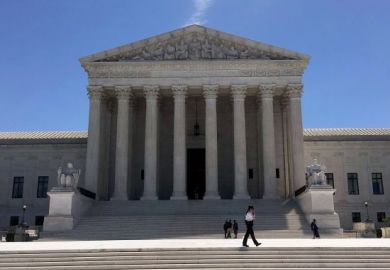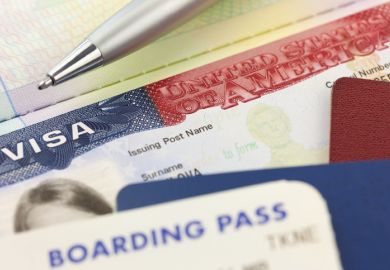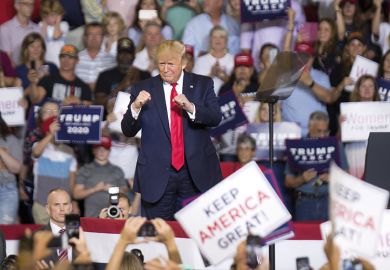The Trump administration has announced new limits on entry visas for work-related purposes, threatening the ability of US universities to hire international staff and to entice prospective students from abroad.
The order extends an existing pause in legal migration to the US, then adds restrictions in visa categories that universities often use for visiting scholars and that companies use to hire university graduates.
Trump administration officials said they were acting to protect US workers. But representatives of US universities said the administration’s actions could have the opposite effect, given the role that the institutions’ graduates play in business formation and job creation, while further aggravating their struggles to attract full-fee-paying international students during the pandemic-driven economic downturn.
“Depriving our nation of talent threatens, rather than safeguards, our nation’s health and economic security,” the American Council on Education, the main US higher education lobby group, said in a statement.
Yet one potentially positive sign in the administration’s order, said Sarah Spreitzer, ACE’s director of government relations, was its lack of any mention of the Optional Practical Training (OPT) programme, which is specially designed to allow international students temporarily to take jobs in the US immediately after they graduate.
More than 200,000 foreign students participate in OPT, and it is considered an integral part of the US higher education experience in many academic fields.
OPT is “a core component of why international students want to come to pursue their higher education in the US”, said Miriam Feldblum, executive director of the Presidents’ Alliance on Higher Education and Immigration, which represents more than 400 US college and university chancellors and presidents.
The Trump administration had been widely understood to be considering new limits on OPT as part of its actions against work-related visas, and its omission from the new executive order was an encouraging sign that it might have backed away from that idea, Ms Spreitzer said.
“We’re pleased that the administration recognised the importance of OPT and our international students to the US economy,” she said.
The administration instead announced restrictions in several other visa programmes, including the H-1B scheme for highly skilled workers and the J-1 scheme for exchange visitors, both of which have higher education implications.
Universities have used both H-1B and J-1 visas to bring foreign faculty and scholars to the US. The H-1B might be even more valuable to universities as an incentive for international students to study in the US because it allows employment for up to six years. The OPT, which is tied to immediate post-education work, lasts one year.
The new executive order is an extension and an expansion of one that the administration issued in April that cited the need to protect US jobs during the coronavirus pandemic as a reason to restrict legal migration to the US. The April provision, suspending the issuance of green cards that allow foreign citizens to live in the US, has now been extended through to the end of the year.
Even without touching OPT, Ms Spreitzer said, the administration’s latest actions on immigration were likely to exacerbate concern among US universities that were already anticipating steep reductions in the number of international students this autumn.
With US embassies closed to almost all visa processing services, foreign nationals hoping to begin their freshman year at US universities will likely have to do it from abroad. That is likely to mean at least a 25 per cent drop this autumn in new international enrolments at US campuses, Ms Spreitzer said, citing institutional estimates.
“Overall,” she said, “we continue to be concerned about the messaging that this is going to send – the message that we are not welcoming to international students and scholars.”
Other recent administration actions have included barring millions of undocumented and international students from obtaining pandemic-related relief grants, and promising a new effort to end the Deferred Action for Childhood Arrivals (DACA) programme after the US Supreme Court refused to end its protections for immigrants brought into the country as children who do not have citizenship or legal residency status.
Even with their victory at the Supreme Court, Dr Feldblum said, students who arrived in the US as children need the federal government to formally resume the process of accepting new DACA applications, and to solve the question of handling those who arrived after programme’s initial 2007 eligibility data.
Without those steps, she said, as many as 100,000 potential new students with foreign origins – beyond the 700,000 people already protected by DACA – remain ineligible for educational benefits.
Register to continue
Why register?
- Registration is free and only takes a moment
- Once registered, you can read 3 articles a month
- Sign up for our newsletter
Subscribe
Or subscribe for unlimited access to:
- Unlimited access to news, views, insights & reviews
- Digital editions
- Digital access to THE’s university and college rankings analysis
Already registered or a current subscriber?







